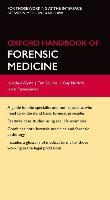
Oxford Handbook of Forensic Medicine
Forensic medicine covers an amazing range of different subjects and no single individual can expect to be an expert in all of them. The Oxford Handbook of Forensic Medicine provides comprehensive coverage of all areas within this complex discipline. Written for specialists and non-specialists alike, it will appeal to practising forensic scientists, as well as lawyers, police officers, and forensic science students. It shows how forensic medicine has been used in
specific cases enabling the reader to apply their knowledge in real life. A detailed glossary of medical terms helps those without medical training to understand medical reports and practices. This easily-portable guide is essential reading for the busy clinical forensic doctor or nurse, and others
working at the interface between medicine and law.
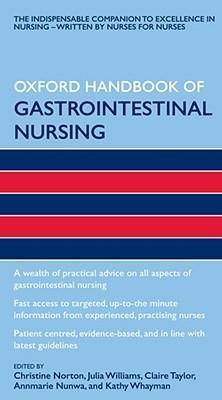
Oxford Handbook of Gastrointestinal Nursing
The role of the gastrointestinal (GI) nurse has changed considerably over recent years. The development of endoscopic equipment has resulted in a demand for skilled nurses to perform procedures which, in the past, were carried out by doctors. In addition, nurses now commonly perform diagnostic tests and prescribe specific drugs in gastroenterology, and the widespread recognition of the need for psychosocial support for gastrointestinal patients, in areas such as Irritable Bowel Syndrome (IBS), has seen a large increase in the number of GI nurse consultants, nurse specialists, and nurse practitioners. GI nurses work with a wide range of patients from those suffering from minor and acute gastrointestinal disorders, through chronic conditions, to those requiring major surgery and treatment for malignant disease. The Oxford Handbook of Gastrointestinal Nursing summarises the current state of knowledge in gastrointestinal nursing and provides user-friendly, evidence-based guidelines on the management of patients with gastrointestinal disorders.
Organised into three sections covering the principles of gastrointestinal nursing, the sections of the gut, and specific disorders of the digestive system, this handbook offers a wealth of information on how to plan, implement, manage, and evaluate nursing care for gastrointestinal patients, whether in the paediatric or adult setting. Topics featured include nutrition, pain management, complementary therapies, prescribing in GI nursing and emergencies. So you can find the information you need without delay, the book is clearly laid out with one topic per double page spread, and written in an easily readable note-based style. Blank pages for writing notes, observations and local protocols allow your handbook to be customised to meet your specific needs. All this is available at your fingertips, in a pocket-sized handbook with hard-wearing plastic covers. Written by practising nurses and subject experts, the Oxford Handbook of Gastrointestinal Nursing is a unique and invaluable companion for practising nurses, and for all health care professionals who are involved in the care of patients with gastrointestinal disorders.

Oxford Handbook of Genetics
The Oxford Handbook of Genetics provides an essential overview of this complex subject, distilled into an accessible format for primary care practitioners and junior doctors. It can be used as an aide memoire to gain advice on dealing with individual patients during the working day, or as a reference text to be read over time. Combining the expertise of leading geneticists with the knowledge of experienced general practitioners, the handbook covers the genetics core curriculum as defined by the Royal College of General Practitioners. It includes sections on elementary genetics, single gene disorders, and chromosomal problems, as well as information about the multifactorial diseases, such as ischaemic heart disease, with which practitioners are more familiar. There are also comprehensive sections on antenatal issues, and cancers. A comprehensive glossary with explanations of genetic terminology, and an extensive list of resources, make this book suitable for all healthcare professionals regardless of their level of knowledge or experience.
Designed to cross the primary-secondary care interface, this unique handbook covers the gap between general health training and genetic specialist training, including specific advice about when, and how, to make a referral to a genetics service. Given the rapid growth in the genetic knowledge base, this book is designed to be both accessible and informative as a substantive educational resource for practitioners.
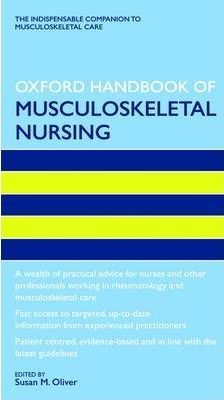
Oxford Handbook of Musculoskeletal Nursing
Rheumatic diseases are the most frequently self-reported, long-standing conditions in the UK and there is an increasing demand for rheumatology services in both hospital and community-based environments. There are currently many drivers for change within the field of musculoskeletal nursing, particularly as the elderly and obese populations, and those with chronic long term conditions, are set to rise. In addition, there will now be a stronger emphasis on nurses and
practitioners in community care managing many more patients who were traditionally referred to secondary care.
The demand for more rheumatology services has already been identified by the Department of Health with the launch of the Musculoskeletal Strategy Framework. Nurses and other practitioners need to develop their expertise within this field, and the Oxford Handbook of Musculoskeletal Nursing is the ideal tool to help them do so.
Providing busy practitioners with information relevant to delivering care, the Handbook is an easily accessible, practical, informative and up-to-date quick reference guide for those with limited support or knowledge of these conditions who want to know the key components of care and when to refer to specialist members of the musculoskeletal services. Topics include a refresher on key principles of musculoskeletal conditions, and detailed information on the most common musculoskeletal
conditions including rheumatoid arthritis, osteoarthritis, osteoporosis and chronic pain. Pharmacological management approaches begin with the consultation and assessment process and build on this information in relation to specific therapies and monitoring side effects and outcomes of treatments. A
specific area of interest for many readers will be guidance on the new generation of therapies (biologics) that will increasingly become an area of specialist nursing expertise.
Clearly laid-out and written in readable note-based style with many illustrations, diagrams and resources to aid the reader, the Oxford Handbook of Musculoskeletal Nursing is an invaluable companion to community nurses, ward nurses, and all those working with patients with musculoskeletal conditions.
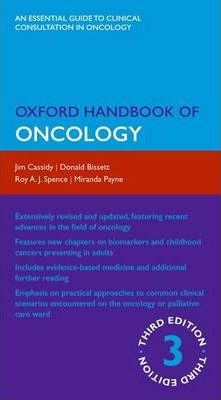
Oxford Handbook of Oncology
This 3rd edition of the successful Oxford Handbook of Oncology, remains, like previous editions, a practical guide to clinical consultations in oncology. It details new approaches to diagnosis, treatment and the principles of palliative care. Now fully updated, extensively revised and featuring additional images and further reading, this new edition provides coverage of the scientific basis and diagnosis, as well as updates on new drugs, biomarkers, the presentation of childhood cancers in adults, and the psychosocial aspects of oncology. An essential guide to the management of everyday clinical situations, this new edition reflects all the recent advances in the field of oncology in a user-friendly and easily accessible format. It will be invaluable to junior doctors in oncology, palliative care, and general medicine, as well as specialist nurses, general practitioners, medical students, pharmacists, and allied health professionals.
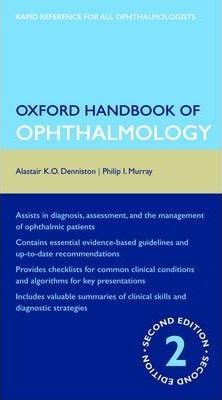
Oxford Handbook of Ophthalmology
Now in its second edition, this new Oxford Handbook of Ophthalmology continues to be an unparalleled source of knowledge, providing immediate access to the detailed clinical information you need – in casualty, clinic, theatre, and on the wards. It comprises a systematic synopsis of ophthalmic disease directed towards diagnosis, interim assessment, and ongoing management. Assessment boxes for common clinical conditions, and algorithms for important clinical presentations illustrate this practical approach. The information is easily accessed, being presented in a standard format with areas of importance highlighted. Key sections for the trainee include clinical skills, aids to diagnosis, and investigations and their interpretation. Basic perioperative care, medical emergencies and advanced life support protocols are included. New to this edition are chapters on refractive ophthalmology – containing practical advice on the treatment of refractive error by use of glasses, contact lenses and refractive surgery – and evidence-based ophthalmology – a helpful introduction to critical appraisal, levels of evidence, and medical statistics as relevant to ophthalmology.
Primarily intended for ophthalmologists, this handbook has become established as a valuable resource for anyone working with ophthalmic patients, whether optometrists, orthoptists, ophthalmic nurses or other health professions in ophthalmology. It has also become a core text for postgraduate examinations.
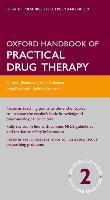
Oxford Handbook of Practical Drug Therapy
Safe and effective prescribing is a cornerstone of proper patient care. There has in recent years been a significant increase in the numbers of healthcare professionals able to prescribe; however, sources of drug information tend to focus on only one area of prescribing. The Oxford Handbook of Practical Drug Therapy links practical information about how to use medicines with concise details about the pharmacology of a drug, and the principles of clinical
pharmacology that govern its action.
The overall structure of this handbook is similar to the UK national formulary, with topics on each drug arranged broadly by therapeutic category. When a drug has several different uses, these are brought together in a single topic, allowing the reader to appreciate its full range of actions, whether therapeutic or adverse.
Each drugs topic provides information in a clearly laid out and standardised form, and includes a graphical representation of the pharmacological actions of the drug, and its potential uses, practical advice on a drug’s major indications, a list of common and serious adverse effects, major drug-drug interactions, practical advice on monitoring for therapeutic and adverse effects, and what to tell the patient.
Teaching points throughout the text draw out pharmacological principles, so that readers can increase their basic knowledge by linking theory with practical examples. Also included are several boxes giving guidance on the approach to therapy of specific diseases an clinical problems. In some cases, algorithms for the treatment of medical emergencies are given, and this new edition features case histories throughout the text to illustrate the issues one may face in practical prescribing.
The Oxford Handbook of Practical Drug Therapy brings together for the first time in a single book really practical information on safe prescribing, with the background knowledge that underpins clinical pharmacology. Fully revised with new guidance and important safety information, this book is aimed primarily at medical students and trainees, it will also be invaluable to family doctors, clinical pharmacists, and nurse prescribers.
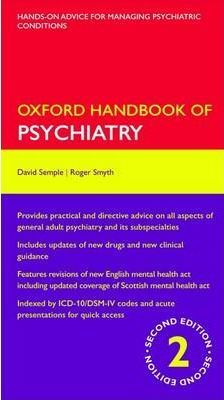
Oxford Handbook of Psychiatry
The Oxford Handbook of Psychiatry provides comprehensive coverage of all major psychiatric conditions and sub-specialities. It is aimed at psychiatric trainees, medical students studying psychiatry, trainees entering individual psychiatric sub-specialities, consultant psychiatrists, general practitioners and other health-care professionals who come into contact with psychiatric patients. It provides detailed and practical advice on the management of psychiatric disorders, in-depth coverage of psychiatric assessment, psychopathology, evidence-based practice, mental health and capacity legislation in the British Isles, difficult and urgent situations, transcultural psychiatry, and therapeutic issues. The new edition features a completely updated legal section with coverage of the new English mental health act, updated coverage of the Scottish mental health act and new coverage of incapacity legislation in England, Wales and Scotland, a completely updated section on schizophrenia, and the addition of new drugs and new clinical guidance from recognized institutions such as NICE.
It also includes specialist chapters on learning disabilities, psychotherapy and child psychiatry reviewed and revised by specialist registrars currently working in the fields. The book is internally cross-referenced and has both key references to important papers and to further information resources. As well as being indexed alphabetically, it is also indexed by ICD-10 / DSM-IV codes, and there is a quick index for acute presentations. This handbook is practical and didactic in style, designed to provide portable reassurance to doctors beginning psychiatry. There is helpful advice for the management of difficult and urgent situations, and the text is peppered with clinical observations on the practice of clinical psychiatry and guidance based upon the experience of the authors.